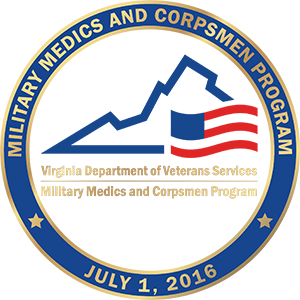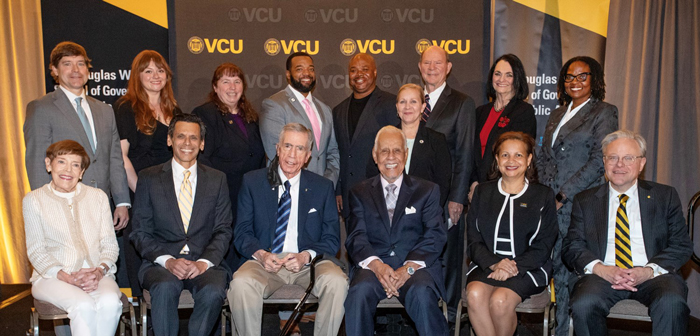Military Medics and Corpsmen Program
- Need: To help veterans transition into civilian healthcare careers.
- Intervention: MMAC and healthcare employers in urban and rural Virginia provide employment and education opportunities to veterans seeking civilian medical credentials.
- Results: MMAC has been able to help 837 veterans, transitioning service members, and military spouses find healthcare employment.
Description
Many veterans who gain medical skills and experience while in the military have trouble finding employment in healthcare after discharge, due to barriers such as their military experience not translating into civilian healthcare credentials. To smooth the transition into civilian careers, the Virginia Department of Veterans Services created the Military Medics and Corpsmen Program (MMAC) in 2016.

Modeled after the Veterans Health Administration Intermediate Care Technician Pilot Program, MMAC pairs medically trained veterans with healthcare systems to receive specialized training, maintain medical skills, and work toward civilian medical credentials. MMAC is a collaboration of local, state, and federal government; nonprofit healthcare associations; and Virginia healthcare systems.
Fifty-seven facilities have agreed to partner with the MMAC program.
Services offered
Program staff review participants' scope of practice to match them to potential employers and send participants' resumes to those employers. Though the program does not directly provide licensure, they can assist MMAC participants by guiding them through the credentialing processes via the Virginia Board of Nursing at the Virginia Department of Health Professions. The MMAC program provides medically trained veterans with four pathways for success.
Path One: MMAC Qualified
Veterans and transitioning U.S. Army Combat Medics, U.S. Navy and U.S. Coast Guard Corpsmen, and U.S. Air Force Medical Technicians who have performed the majority of the MMAC General Scope of Practice skills within the last twelve months will be eligible to continue practicing those medical skills in a civilian healthcare setting while they gain civilian healthcare credentials and licensure. Participants are under supervision of a physician or registered nurse.
Path Two: No Veteran Left Behind
Veterans with military medical experience who do not meet MMAC qualification standards are assisted by the MMAC "No Medic or Corpsmen Left Behind" pathway. The MMAC program assists all medically trained veterans with resume writing, mentorship, and connection with healthcare and non-healthcare companies that have been certified by Virginia Values Veterans (V3). Virginia-based companies can become V3-certified by following certain veteran-friendly standards of practice.
Path Three: Healthcare Leadership
Some veterans spend many years in the military and gain management experience or complete advanced degrees. The MMAC program helps veterans find civilian healthcare employment in areas such as safety, supply chain, infrastructure, and information technology.
Path Four: Military Spouses
The MMAC program helps military spouses find employment at MMAC Partner Healthcare Systems and V3-certified healthcare employers.
Results
MMAC has helped 837 veterans and military spouses find healthcare employment within the healthcare system around the Commonwealth of Virginia. Of the 837 hired, 270 have been hired as "MMAC Qualified," 370 have been hired as "No Veteran Left Behind," 144 have been hired as "Healthcare Leadership," and 53 military spouses have been hired.
MMAC participant testimonials show that participants appreciate the smoother and quicker transition into civilian careers.
State legislation passed in July 2021 expanded the types of healthcare facilities eligible to participate in the MMAC program. MMAC can now enter into Memoranda of Agreement with facilities such as urgent care centers, specialty clinical and surgical facilities, community health clinics, and dialysis centers. The legislation also created two additional pathways to healthcare employment.
MMAC has assisted multiple states in creating a similar program, including Arizona, Florida, Maryland, Massachusetts, Mississippi, New Hampshire, North Carolina, Ohio, and Wisconsin.

Challenges
The biggest barrier was crafting, advocating for, and passing state legislation. To do this, coordination and approval were needed from the Virginia Department of Health Professions and the Virginia Department of Health's Office of Licensure and Certification. Without having the support of those entities as well as the Virginia General Assembly and two governors, this program would not be possible.
Educating the civilian workforce and healthcare leadership has been extremely important since the start of the MMAC program. Even though there is state law that supports and allows MMAC Qualified veterans to practice certain skills in a civilian hospital setting, it takes a great deal of education for the civilian healthcare community to understand and accept MMAC program participants and allow them to practice certain skills.
Even though the MMAC program has memoranda of agreement with all MMAC Partner Healthcare Systems, signed by CEOs, chief medical officers, and others at the highest levels of leadership, that information does not always trickle down to those who may be integral in making the program function optimally, such as hiring managers, human resources staff, nurses, and other clinical leadership.
Replication
Involve key players in the initial stages of program development. Legislation should be codified and enabling and should address concerns like supervision, Medicare and Medicaid reimbursement, and scope of practice. These steps are important for healthcare leaders' confidence in the program, increased participation, and program expansion.
Educate hospitals and health systems about the value that medically trained veterans can bring to their organizations. In some cases, civilian health professionals may not realize what kind of medical training and experience medics and corpsmen have.
The MMAC team provides outreach to medical facilities and companies, transitioning service members, and the Department of Defense and military installations. The V3 program is a great resource for the MMAC team to learn about future potential partnerships with employers.
The MMAC team uses the following outreach methods:
- Print materials such as brochures, pop-up displays, and military branch-specific flyers
- Videos, including Hire Profiles
- Web, including social media, online ads, and an employment website
Contact Information
James O. Byrd III, Program CoordinatorMilitary Medics and Corpsmen Program
804.221.3190
james.byrd@dvs.virginia.gov
Topics
Health workforce
· Veterans
States served
Virginia
Date added
July 16, 2018
Suggested citation: Rural Health Information Hub, 2025 . Military Medics and Corpsmen Program [online]. Rural Health Information Hub. Available at: https://www.ruralhealthinfo.org/project-examples/1023 [Accessed 14 February 2026]
Please contact the models and innovations contact directly for the most complete and current information about this program. Summaries of models and innovations are provided by RHIhub for your convenience. The programs described are not endorsed by RHIhub or by the Federal Office of Rural Health Policy. Each rural community should consider whether a particular project or approach is a good match for their community’s needs and capacity. While it is sometimes possible to adapt program components to match your resources, keep in mind that changes to the program design may impact results.
